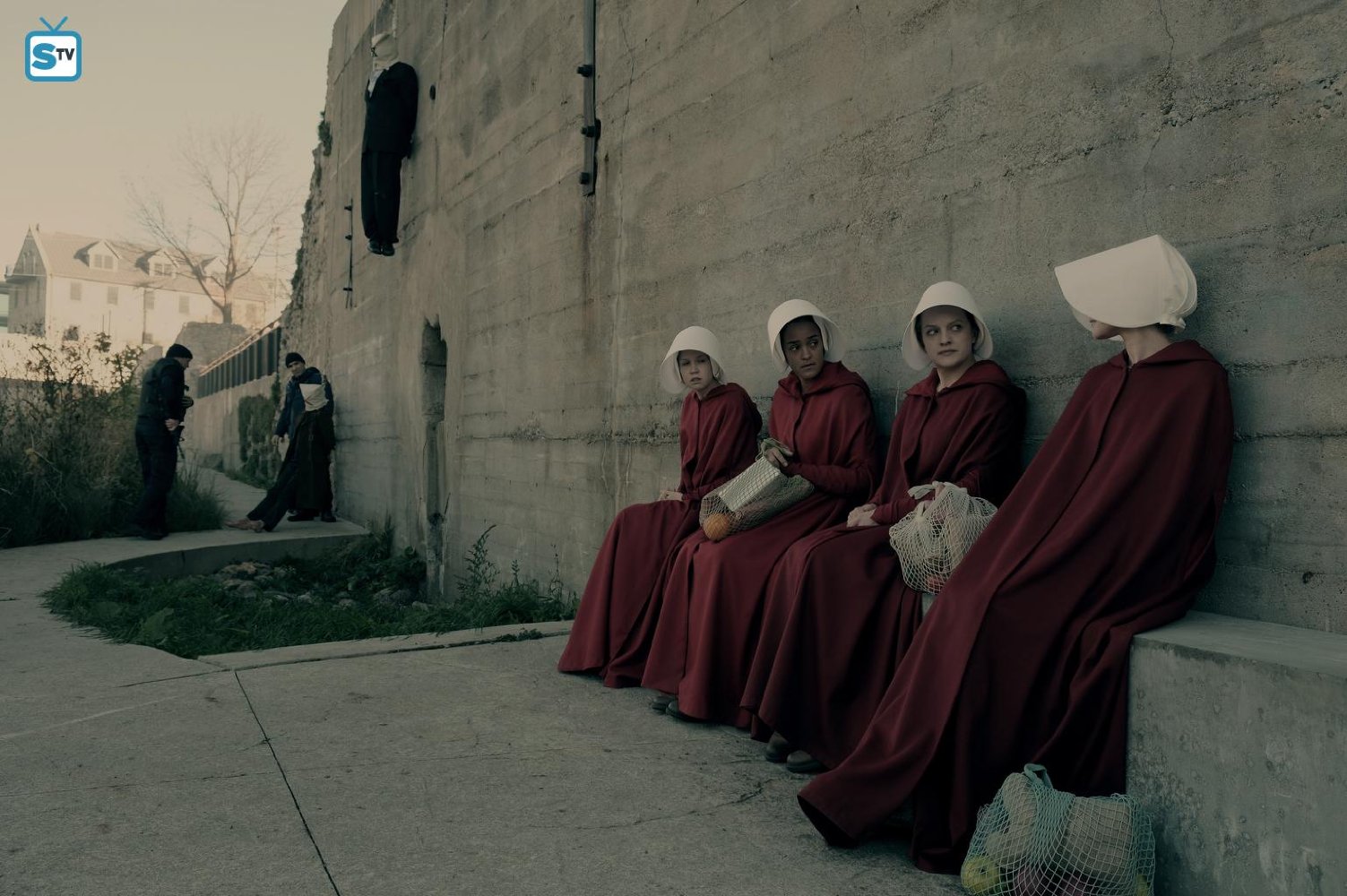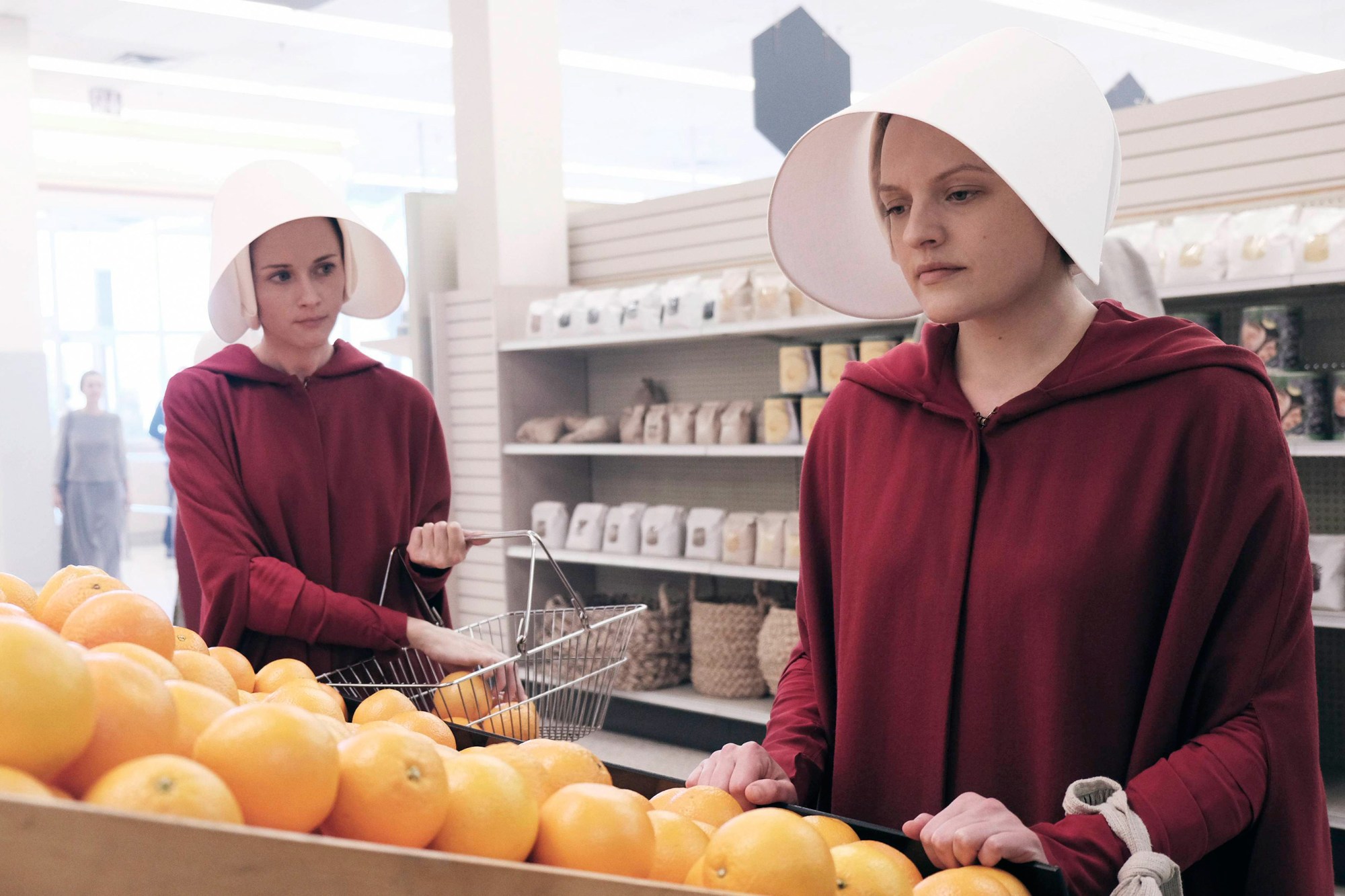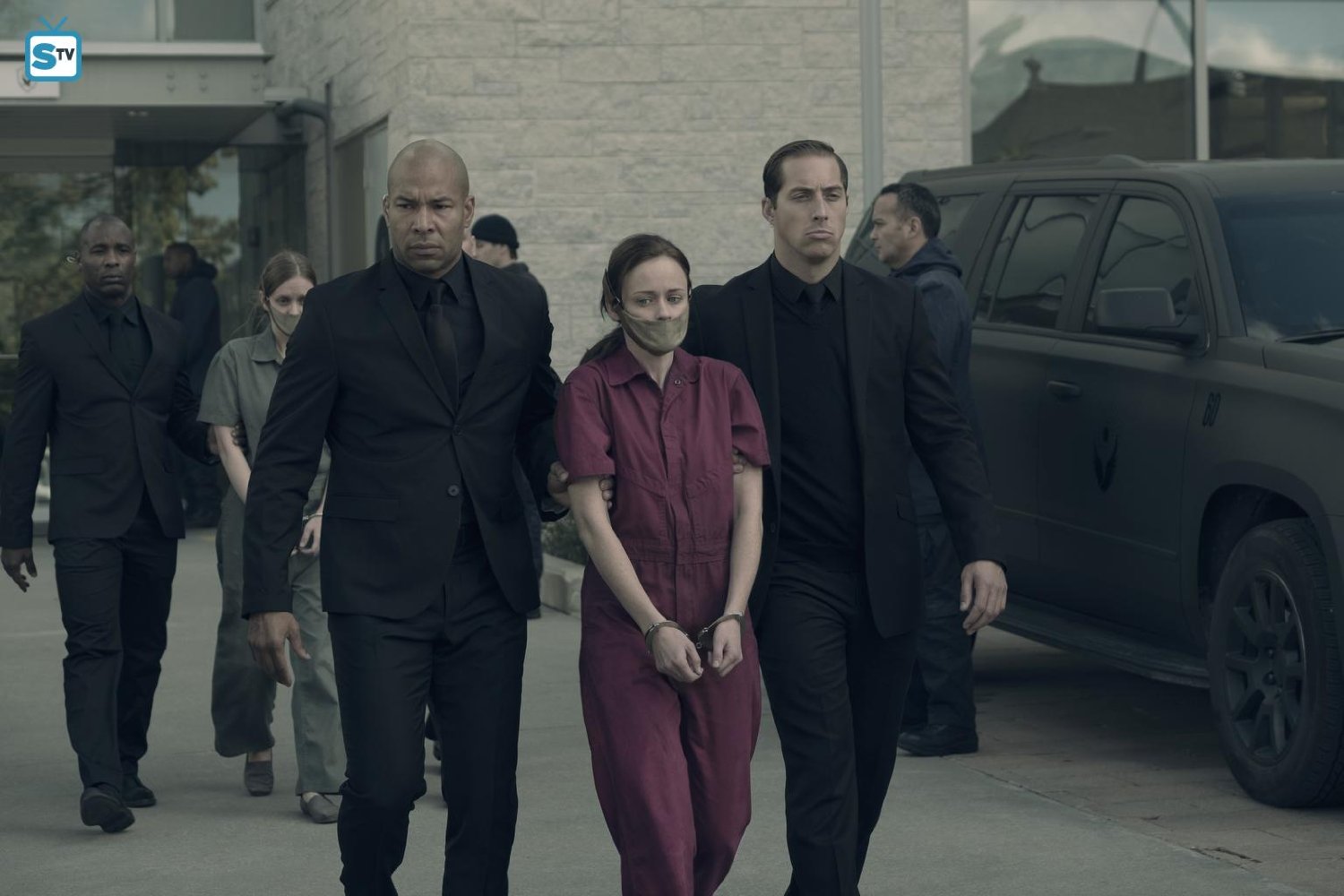It’s funny now to remember that Hulu’s The Handmaid’s Tale was greenlit (and largely produced) before Donald Trump became president. Since the last adaptation of Margaret Atwood’s 1985 novel was announced last year, activists have adopted the story’s iconography to protest his administration and contemporary Republican policies. If Hulu hadn’t announced the show before Trump became the election’s Republican frontrunner, another network surely would have since.
The Handmaid’s Tale takes place in Gilead, a version of America where environmental disaster has rendered most of the population infertile and given rise to a military dictatorship under a Christian fundamentalist group. Society has enslaved fertile women as “handmaids,” or sex slaves to the upper class. In a society where babies are in short supply, Gilead promises a return to “traditional values” where abortion and homosexual relations are forbidden, women are not allowed to read or occupy high-level positions, and one-percenters keep the children—the primary resources in this society—that their handmaids produce.
https://www.youtube.com/watch?v=PJTonrzXTJsSuffice to say, drawing parallels between Gilead and Trump’s America offers a pretty harsh take on the current administration. But there are some similarities: Since he took office, the president has defunded overseas groups providing abortion services and signed legislation to restore state and local governments’ right to withhold funding from family planning services (whether or not they provide abortion). Under the GOP’s health-care reform bill—still pending approval in the Senate—diagnoses resulting from sexual assault could be considered pre-existing conditions, for which states can raise premiums. In the first episode of The Handmaid’s Tale, when a handmaid tells a story of being gang-raped, an enforcer of Gilead law encourages her peers to blame her for it, saying it was “her fault.” While the Trump administration isn’t policing fertile women’s bodies in the literal sense of the word, as Gilead does, so far his administration seems prepared to punish women for seeking control over their reproductive health.*
Still, the new show is not just a story for the Trump era—it’s also a timeless character study of a woman trying to make sense of a world with precious few liberties. In a roundtable discussion, four writers at Pacific Standard—Francie Diep, Elena Gooray, Katie Kilkenny, and Varun Nayar—discuss the show’s depiction of the central character Offred (played by Elisabeth Moss) and why it’s hit such a nerve in America in 2017.

Katie Kilkenny: It seems impossible to talk about The Handmaid’s Tale without mentioning The State of America today, so let’s get that out of the way: What have been the moments in the series so far that have struck you as particularly relevant or interesting in 2017?
Elena Gooray: Seeing policies around reproduction that first and foremost make me think, “Get the hell away from my body, please.”
France Diep: When the commander talks about how much safer Gilead is for women than society before, it reminded me of the hot discussion in recent years about the prevalence of rape on college campuses. The show presents one very bad way to deal with that—by returning to traditional roles and standards for women. Plus, some folks have long used “protection of women” as an excuse to take away women’s rights.
Gooray: To borrow one of the best quotes from episode five, “Better never means better for everyone.”
Diep: The show also depicts a society built by men that prescribes very specific rules for women. Makes you think of all the folks in charge of rebuilding our health-care system, right?
Kilkenny: For my part, I was shocked me to learn that The Handmaid’s Tale was produced before the 2016 presidential campaign after hearing that speech in the first episode by Aunt Lydia: “I know this must feel very strange. But ordinary is just what you’re used to. This may not seem ordinary to you right now, but after a time it will. This will become ordinary.”
Nayar: That idea was even more haunting given the show’s many flashbacks to a world that’s eerily similar to ours.
Kilkenny: They have Uber!
Gooray: And Tinder!
Kilkenny: They go a tad heavy-handed in their attempt to show “liberated women” in the flashbacks. Moira’s a bit one-dimensional in her radical feminism: She’s a lesbian! She swears! She kinda hates men!
Gooray: And she ends up in an authoritarian wasteland where men are hanged without reason, and women have zero say over their sexual or reproductive experiences. It’s almost too on the nose.

(Photo: Hulu)
Diep: Moira is a type that appears in several Atwood books, like Amanda in the Maddaddam Trilogy: the sexier, sometimes crazier, more radical, braver version of the main character. The main character reacts how I think I might react—surviving, making compromises. The Moira type reacts in the way I wish in my heart I would react, by rebelling.
Nayar: Speaking of rebellion, let’s talk about Offred’s narration? We don’t get that for any other Handmaid. Though she lacks autonomy, she’s still shaping her narrative for the viewer.
Diep: Small thing, but that narration helps underscore the power of reading and literature in this society, which are forbidden to women. June is a smart lady, in her head. She’s funny and articulate. She’s good at Scrabble.
Kilkenny: Her sassiness in the narration is such a great move for a television adaptation too. Offred narrates the book, with fewer expletives. Here, the explicit narrative makes her character pop in a story with a lot of moving parts.
Nayar: Every “fuck” felt great to hear.
Diep: Speaking of which, how do you guys feel about the humor in the show?
Nayar: There’s a scene in episode one that I think is a great example of the show’s humor. On encountering three men hanged by the government for resisting, Offred identifies them and remarks, internally: “A priest, a doctor, a gay man. I think I heard that joke once. This wasn’t the punchline.”
Kilkenny: Who originally said “Laugh so you don’t cry”?

(Photo: Hulu)
Diep: Sometimes the music selection is funny too.
Gooray: I strongly supported a couple of the choices and a couple of others made me cringe-laugh. “Don’t You (Forget About Me)” synched up so well in a moment when Offred thought she had just gotten a valuable bit of information for the Resistance. But then when the handmaid Janine is holding the baby she’s just given birth to but won’t get to keep and is singing Bob Marley’s “Three Little Birds” to herself? I was just like: “Why? Is this really how the character would respond?”
Nayar: For a show with so much restrained dialogue, the pop music choices feel a little on the nose. I wonder if it’s an editing decision producers made in post-production to draw the audience in more, as opposed to simply creating a mood.
Kilkenny: I’d counter that the music choices feel like something that might be on an oldies station. Which felt appropriate! Especially to express the interiority of women who might be (appropriately) nostalgic.
Gooray: Another pairing I liked was the song that played when Ofglen realizes she’s undergone female genital mutilation, Jay Reatard’s “Waiting for Something.” Pitchfork called it callous to pair a punk song with such a horrifying procedure, but, to me, music that channels rage is more than fair. Speaking of which, can we talk about all the Oflgen stuff in that episode?
Kilkenny: I loved that the show fleshed out Ofglen in a way that the book didn’t (or couldn’t have, given how closely it hewed to Offred’s perspective). But the amount of detail that the show went into about her time in captivity seemed cruel and manipulative to me by episode five, when the show killed her off abruptly. One thing that really annoys me about this show is the way it constantly has female friends nodding to each other before they either a. betray each other or b. kill themselves. It’s a narrative shortcut, and lazy writing, I think; rather than show women actually hurting each other in small but significant ways, they keep “good” women good.

(Photo: Hulu)
Gooray: I’d say they do make the women more nuanced than “good” or “bad.” Offred began her marriage as an affair, which certainly doesn’t make her “bad,” but lands her in a moral gray area. And as odious as Serena Joy generally is, I often feel bad for her.
Nayar: I felt that way about Serena Joy too. I want to know more about her relationship with the commander, and how characters like them—who have a lot of power, at least on the surface—are dealing with Gilead’s transformation.
Diep: And Serena Joy and June are so alike in age and appearance—it shows how one could have ended up with the fate of the other, at any time.
Kilkenny: It does add a really nice dimension that they are almost peers in a way; it makes her treatment of Offred like a pet that much more devastating. That macaroon moment! Offred has way more strength than I would—I would have totally consumed that whole delicious-looking thing.
Nayar: Pivoting a bit, after watching the first few episodes I read up on what Atwood had to say about the way the show was handled. She made a very interesting counterpoint to all this talk of how the show appropriately predicts our current state of affairs. In fact, she calls it an “anti-prediction”: “Let’s say it’s an anti-prediction: If this future can be described in detail, maybe it won’t happen. But such wishful thinking cannot be depended on either.”
Gooray: I love that Atwood’s comments on her intentions make for an even bleaker read than “This show is a sign o’ the times.” Instead, it’s “I tried to help stop this and here we are.”
Nayar: Yeah, to me the quote says that this show is definitely responsive, but to more systemic issues that haven’t just appeared out of nowhere.
Diep: For sure. This book was timely when it was published in 1985. It was timely when I first read it in the early 2000s. Societies often seeks to control women’s bodies, in different ways—they eternally want to separate the Madonnas from the whores; they struggle with how to balance “freedom to” and “freedom from.” I think we are far from Gilead, but it offers good lessons.
Kilkenny: Do you guys think Hulu’s version can make a dent in de-“normalizing” state control over women’s bodies in a way that previous adaptations haven’t? Or will its greatest effect be that we all know now that Alexis Bledel can play against type?
Gooray: This isn’t the show’s fault, but I’m not sure it can do much more than preach (rousingly and movingly) to the choir in terms of stances toward women’s bodily autonomy. But hey, it can introduce a new generation of young watchers to The Breakfast Club, so there’s that.
*Update—May 12, 2017: This post has been updated to more accurately reflect the AHCA’s provisions for victims of sexual assault.





